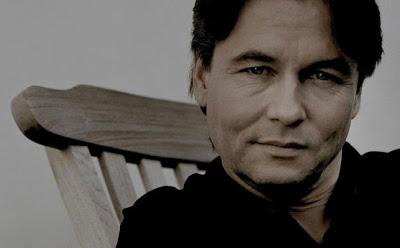by Paul J. Pelkonen

Your host: composer Esa-Pekka Salonen offered Monday night's CONTACT!
concert with the New York Philharmonic at National Sawdust.
Photo by Mat Hennek © 2015 Deutsche Grammophon/UMG.
Mr. Salonen programmed a rich, varied evening featuring one of his own watershed works alongside three composers he counts as his influences: Witold Lutoslawski, Franco Donatoni and Niccolò Castiglioni. The latter two were among his teachers as he studied music composition in Italy alongside fellow Finns Magnus Lindberg and Kaija Saariaho. Each work was introduced by Mr. Salonen at length, who also included personal anecdotes about each composer, adding color and humanizing these unfamiliar creators and their works.
Lutoslawski's String Quartet is unusual in that it rejects the normal horizontal organization of music in favor of a "vertical" approach. The lines of violins, viola and cello did not so much interact as collide and coincide, starting with a series of small scraped notes in the first violin. This initial tone-row births the first movement. Gradually, the other instruments entered, building towers of sound that shifted, loomed and threatened to topple on the listener. The four lines intertwined in complex counterpoint, but the listener is always on edge for impending disaster.
The second movement flowed from the first, a warren of tight, right-angled figures that snarled each other even as they bent and twisted in ever-increasing complexity. The music stopped, slowed and emerged as a song of mourning, the sound of heartache movingly expressed in a new musical language. The complex counterpoint returned with a vengeance, thrusting the listener back into the assault of sound before slowly losing steam, dying away and returning to the plucks, the scrapes and finally, the silence.
Donatoni's HOT was a different beast. Imagine free jazz put into the straitjacket of serialism, with loping acoustic bass lines underpinning stabs of trombone, trumpet, sax and clarinet. There was a cheerful violence about this music, with the players clearly indulged their technical skills while staying strictly within the doxology of the written score. Sections burst into vivid life with every instrument getting a solo and in the case of percussionist Daniel Druckman, solos on multiple instruments: tuned percussion, tom drums and more.
The next work was completely different. Subtitled Six Sacred Songs for Piano, Dulce refrigerium was a set of brief pieces played by Eric Huebner. These were short and sometimes aphoristic, creating fuzzy impressions suggested by their brief titles. Humus had the solid quality of earth, with its stark intervals and grounded main theme. Urquelle was a burst of florid notes, erupting from Mr. Huebner's fingers and illuminating the listener with its bright tones. Lied on the other hand relied on one of the pianist's hands, stunning in its very simplicity. Chorale ended the cycle with its lone diatonic notes, expressed abruptly in the last three chords to bring the listener back to earth.
Mr. Salonen's FLOOF is written for (among other things) soprano, clarinet, piano, cello, percussion and synthesizer. Inspired in part by Stravinsky and by Quincy Jones' arrangements of the Michael Jackson album Bad, this is a setting of texts by the science fiction author Stanislaw Lem, chronicling the attempt of an artificial intelligence to write epic poetry. A bang of percussion and soprano Hila Plittman started vocalising, yelping and roaring, as she portrayed the A.I. seeking articulation and communication. Long, keening notes were sung and screamed over the clatter, eventually emerging with the work's title rendered as a question.
When the stream of poetry finally emerged, it did so slowly as an epic text written only using the letter S. Soprano sounds surged sharply. Strings swept Salonen's sounds smartly supporting singer's squalling songs. (OK. Enough!) The work then surged ahead with a James Joyce-like stream of consciousness in both the libretto and music, suggesting that if the novels of William Gibson ever find place on the operatic stage, Mr. Salonen might be the ideal composer. Its ending was a final, ironic query: "FLOOOOOO-OO-OO-OO-OOF!?"

